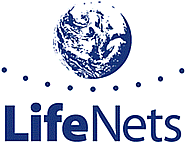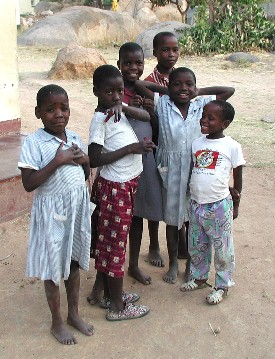A project to support the hard work at
MATTHEW RUSIKE CHILDREN'S HOME
By JOSEPH DITS
jdits@sbtinfo.com
February 14, 2002
More photos
LifeNets Home
 Got an assignment for ya, folks: Raise 120 children in Zimbabwe who were either abused, neglected or orphaned. While you're at it, cultivate a huge garden, raise chickens and run a preschool.
I'll give you a staff
of about two dozen. You can't pay them much. But, here's the good part:
Along with agriculture, I want you to teach the kids sewing, computers
and
other employable skills; see if you can hook the older kids up with a
swanky
hotel to learn about the hospitality business, too. Got an assignment for ya, folks: Raise 120 children in Zimbabwe who were either abused, neglected or orphaned. While you're at it, cultivate a huge garden, raise chickens and run a preschool.
I'll give you a staff
of about two dozen. You can't pay them much. But, here's the good part:
Along with agriculture, I want you to teach the kids sewing, computers
and
other employable skills; see if you can hook the older kids up with a
swanky
hotel to learn about the hospitality business, too.
| Joseph Dits is a reporter covering urban and social issues for the South Bend
(Ind.) Tribune. Since 1998, he has written about everything from struggling
neighborhoods to poverty to the concerns of Latinos. South Bend is his hometown.
He also does a lot of biking and cross-country skiing and took a
church-to-church bike tour of central Ukraine in June 2001. |
Matthew Rusike Children's Home in Zimbabwe is doing all of that.
Meanwhile, the Home provides stability, hope and an experience that
the kids never
--
never! -- forget. The kids have told me so. I spent all of 1996 as a
volunteer at the orphanage, where the kids wrote about their lives and
dreams for the newsletter I started (which continues to be published
today).
Now, a LifeNets project will help the Home to earn more income from
one of its agricultural programs. Kids help at every stage with production of
maize, leafy greens, vegetables and poultry. They
eat some of the product, and the Home sells the rest to generate
income. We are seeking donations to purchase a "de-huller". This
machine removes the outer surface
of the maize kernels so that the maize can be ground into a finer
quality
meal, thereby selling for a higher price. Maize is Zimbabwe's staple
food.
It makes something called "sadza," which looks like grits but is as
thick as
mashed potatoes. People use their fingers to eat it with their favorite
greens, beans, meat and other side dishes. The de-huller machine costs
between $2,000 and $2,500 (U.S. dollars). Any additional money we raise
will
go to badly needed seeds, fertilizer and pesticides, which in 2001 cost
a
total of $1,400 (U.S.). 
Matthew Rusike Children's Home is a green, pastoral place with fruit
trees and soccer lots. Boys play barefoot in the dirt. There's enough
space between the various buildings -- the dorms, the dining hall, the
office, etc. -- to give the children and staff plenty of elbow room.
The Home sits
in the village of Epworth on the outskirts of Zimbabwe's capital,
Harare.
The children, ages 3 to 18, come from the saddest of stories: from
parents
who've died or gone to jail or have become abusive, or from relatives
who
were charged with the kids' care but have turned negligent. Zimbabwe's
orphan numbers continue to grow since the nation has one of the worst
AIDS
rates in Africa.
Regular church life helps the kids to heal inside. And, the Home roots
all of its operations in native Shona customs, just as it has since it
was founded in 1950 by the Pastor Rusike, a Shona man himself. Every
day, I'd watch kids come home from school to eat lunch. A few would
kneel briefly beside a female staff member who was dining on the rocks
outside, bow their
heads, softly clap their hands and offer a greeting. Very traditional.
Very
loving. Most kids attend school in the village while some move to a
higher
echelon at boarding schools. They read books in the libraries and seek
the
tutoring of volunteers. Kids dream. So do the board and superintendents,
who
speak of one day establishing smaller, family-style settings to give the
children more one-on-one attention.
The Home receives some financial aid from the government but cannot
survive without the support of donors. Friends in Australia and
England have done
great things, bringing irrigation, solar heating and more. But, running
the
Home is a lot more expensive now than when I was there. Zimbabwe's
economy
has been sinking with some shaky political news. The nation's leadership
is
demanding that white farmers give up their land. Meanwhile, thugs have
used
violence to take the land. Most people -- certainly the MRCH kids --
have
been quite safe as the violence has been isolated to certain farms.
Still,
gasoline sold for $7 (U.S.) per gallon in October 2001. The Home manages
to
feed each child for roughly $15 (U.S.) per month.
Neither I nor Vic Kubik believe it was mere chance that allowed him
and his wife, Beverly, to visit the Home in October 2001 (see
photos of their visit by clicking here). They
happened to be in Harare for a church conference. It seemed as if
transportation woes were conspiring to keep them from getting to the
Home, but they made it and reported having a "wonderful!" visit. Was
it divine intervention? Hmmmm.
Would you like to host a fund-raiser at your church, club or
community? To help, contact Joseph Dits in South Bend, Indiana, at
(219) 235-6158 or jdits@sbtinfo.com. He can send you a videotape of
the Home and other promotional materials you may need.
Check out the Home's own Web site, www.matthewrusike.org, which
includes photos and stories of the children. The site was made
possible through the efforts of the Qantas Airlines Cabin Crew Team in Australia, a bunch of good
mates who've worked their koala tails off for the Home.
|
 Got an assignment for ya, folks: Raise 120 children in Zimbabwe who were either abused, neglected or orphaned. While you're at it, cultivate a huge garden, raise chickens and run a preschool.
I'll give you a staff
of about two dozen. You can't pay them much. But, here's the good part:
Along with agriculture, I want you to teach the kids sewing, computers
and
other employable skills; see if you can hook the older kids up with a
swanky
hotel to learn about the hospitality business, too.
Got an assignment for ya, folks: Raise 120 children in Zimbabwe who were either abused, neglected or orphaned. While you're at it, cultivate a huge garden, raise chickens and run a preschool.
I'll give you a staff
of about two dozen. You can't pay them much. But, here's the good part:
Along with agriculture, I want you to teach the kids sewing, computers
and
other employable skills; see if you can hook the older kids up with a
swanky
hotel to learn about the hospitality business, too.